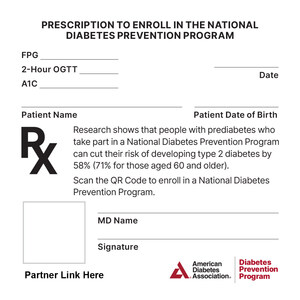ARLINGTON, Va., Nov. 16, 2018 /PRNewswire/ -- On the second anniversary of the Make Insulin Affordable initiative, the American Diabetes Association® (ADA) announces that more than 400,000 Diabetes Advocates have joined the call for affordable insulin for all who need it—the largest response to an ADA call to action to date. After its examination of the insulin supply chain, ADA and its Insulin Access and Affordability Working Group (Working Group) published recommendations and public policy solutions to address the problem. The ADA reaffirms its commitment to implementing these solutions and achieving affordable insulin for all who need it.
418,220 people have signed the petition. Their voices have been heard. Diabetes Advocates called for Congressional hearings to investigate the reasons for the dramatic increases in insulin costs. The U.S. Senate Special Committee on Aging answered with a hearing in May of this year. Chief Scientific, Medical, and Mission Officer William T. Cefalu, MD, testified about the impact of the high costs on individuals with diabetes.
Diabetes Advocates called for Congress to take action to ensure all people who need insulin have affordable access. The Congressional Diabetes Caucus answered by releasing a list of policy recommendations they intend to pursue. Many of the Caucus' recommendations align closely with ADA's own proposals.
"There is no substitute for insulin, and access to insulin is a matter of life and death for more than 7.5 million Americans with type 1 and type 2 diabetes. Too many are faced with the unacceptable choice of either rationing or forgoing insulin doses to reduce out-of-pocket costs, despite the serious and potential deadly complications of improper insulin dosing," said Dr. Cefalu. "We are grateful for the continued collaboration of Congressional leaders to help us address this critical problem, including Senate Diabetes Caucus Co-Chairs Susan Collins and Jeanne Shaheen, and Congressional Diabetes Caucus Co-Chairs Diana DeGette and Tom Reed. Long-term solutions to this problem are our shared priority."
Since the launch of ADA's campaign, increased pressure from Diabetes Advocates has had a tangible impact for people with diabetes. States have passed legislation to require drug coverage to be more patient friendly. More discounts negotiated in the insulin supply chain will be shared with people with diabetes. These milestones are important, but our work will not be complete until individuals with diabetes see relief at the pharmacy counter.
The average price of insulin nearly tripled between 2002 and 20131. The rising cost of and access to insulin ultimately impacts everyone and especially people with diabetes and their families, health care providers, insurers, employers and our national health care system. Current estimates project that diabetes was the most expensive chronic illness in the U.S. in 2017, at a total of more than $327 billion per year including $15 billion for insulin2.
The ADA's Make Insulin Affordable website (makeinsulinaffordable.org) includes information and resources for people who are struggling to pay for insulin, including new patient assistance programs recently launched by the insulin manufacturers as well as private assistance programs. The site also includes important links to information about the health insurance marketplaces and how to become a Diabetes Advocate.
"High insulin costs are impacting millions. We remain resolute in our commitment to meaningful solutions for this crisis," concluded Dr. Cefalu.
About the American Diabetes Association
Approximately every 21 seconds, someone in the United States is diagnosed with diabetes. Nearly half of the American adult population has diabetes or prediabetes, and more than 30 million adults and children are living with the disease. The American Diabetes Association (ADA) is the nation's leading voluntary health organization on a mission to prevent and cure diabetes, as well as improve the lives of all people affected by the disease. For nearly 80 years, the ADA has driven discovery by funding research to treat, manage and prevent all types of diabetes, while working relentlessly for a cure. Magnifying the urgency of this epidemic, the ADA works to safeguard policies and programs that protect people with the illness, those at risk of developing diabetes and the health care professionals who serve them by initiating programs, advocacy and education efforts that can lead to improved health outcomes and quality of life. To learn more or to get involved, call 1-800-DIABETES (1-800-342-2383) or visit us at diabetes.org. Information is available in English and Spanish. Join the conversation with us on Facebook (American Diabetes Association), Twitter (@AmDiabetesAssn) and Instagram (@AmDiabetesAssn).
1 Hua X, Carvalho N, Tew M, Huang ES, Herman WH, Clarke P. Expenditures and prices of antihyperglycemic medications in the United States: 2002-2013. JAMA 2016;315: 1400–1402.
2 Economic Costs of Diabetes in the U.S. in 2017. American Diabetes Association. Diabetes Care 2018; Mar; dci180007. https://doi.org/10.2337/dci18-0007.
Contact: Michelle Kirkwood, 703-299-2053
[email protected]
SOURCE American Diabetes Association
Related Links
WANT YOUR COMPANY'S NEWS FEATURED ON PRNEWSWIRE.COM?
Newsrooms &
Influencers
Digital Media
Outlets
Journalists
Opted In






Share this article